(Check out the video above for the most important clips from the speeches and one-on-one chats with: Mayor Keith Wilson, city councilors Tiffany Koyama Lane, Olivia Clark, and Loretta Smith, and local bike bus leader Lauren McCune.)
It was a big morning at City Hall for transportation reformers as elected officials and advocates came together in the City Hall atrium to renew Portland’s dedication to being a city where folks on foot and on bikes can not just exist on our streets safely, but feel and spread joy while doing it.
Bike bus advocates waltzed in accompanied by a loud boombox, there were pothole donuts, city staff dressed up in uniforms including a traffic cone, people were making buttons and there were more high-fives than handshakes — it was a vibe I haven’t felt inside City Hall for at least a decade.
It was a three-fer: Bike bus advocates showed up (with a booming loudspeaker) to kick off Bike Bus Week, Portland Mayor Keith Wilson made an official proclamation that this is the start of Bike and Walk to School and Work Week, and City Councilor Tiffany Koyama Lane formally proposed her Vision Zero resolution at a City Council meeting that directly followed the morning festivities. The mood was jovial and optimistic. That might be because cycling and bike bus advocates just tend to have that kind of energy, but it also might reflect that the political stakes were not that high. That’s because Koyama Lane’s resolution merely states intentions and forms a task force — it includes no dedicated funding or strong policies that might move the needle on getting more people to walk and bike.
When I put in the form of a question to Councilor and Transportation & Infrastructure Committee Chair Olivia Clark, she said, “I think you need to watch what happens [at city council] on Wednesday.” Clark said that’s when budget amendments will be discussed. “So just hold on to your bike helmet,” Clark added, which I took as a pretty big clue that there will be funding for Vision Zero up for discussion eventually.
I also asked Councilor Koyama Lane to respond to folks who feel her resolution doesn’t go far enough. “I think those feelings are really understandable,” she said. “I think that skepticism makes sense, and we’re going to have to earn trust back.” But she didn’t stop there. Koyama Lane spoke with confidence that she and her team (working directly with advocacy groups and community leaders) are committed to “giving Vision Zero more visibility.” One concrete step she’s taking to achieve this is to put forward a budget amendment this week that will pull an existing Vision Zero program employee out of the Portland Bureau of Transportation and assign them to the Deputy City Administrator’s office.
Later in the council meeting, Koyama Lane said, “I’m ready to spend all my [political] capital on this.”
Koyama Lane has clearly been in contact with Portland’s amazing stable of road safety advocates, many of whom showed up to the event today.
Lauren McCune is a mom, the leader of the Abernethy Elementary School Bike Bus, and an organizer with Bike Bus PDX. In a moving speech, she talked about how the bike bus has a profound impact on kids and parents in her community. “Bike buses work for one reason,” McCune said. “Because people are awesome. When citizens have the tools and the environment to make better choices, we will make better choices; but our transportation system often pushes people to make choices that are actively harmful to our bodies, our communities, our kids and our planet.”
“If Portland is to walk the walk and once again, be the most livable and green city in the country, then all of us will be the ones leading the way. Now is the time to show up. Now is the time to ride together,” she continued.
After the rally and speeches in the atrium, Councilor Angelita Morillo also mentioned she plans to unveil Vision Zero-related amendments Wednesday. Morillo has three separate amendments that seek to reallocate additional police funding in the Mayor’s proposed budget to PBOT and target specific investments on Cesar E Chavez Blv that would total $800,000. “To me, traffic safety is public safety,” Morillo said, “and that when we talk about transforming our roads and our infrastructure in a way that keeps people safe as they are going about their community, that’s community safety too.”
That position might make for an interesting conversation with Mayor Wilson. In his remarks this morning, he reiterated strong support for biking and walking. Wilson said his administration is “absolutely focused” and that, “It is time for us to double down on making sure that every time you bike and walk to work we ensure that you get home every day to your family safe and well.”
Browse photos from the event below…
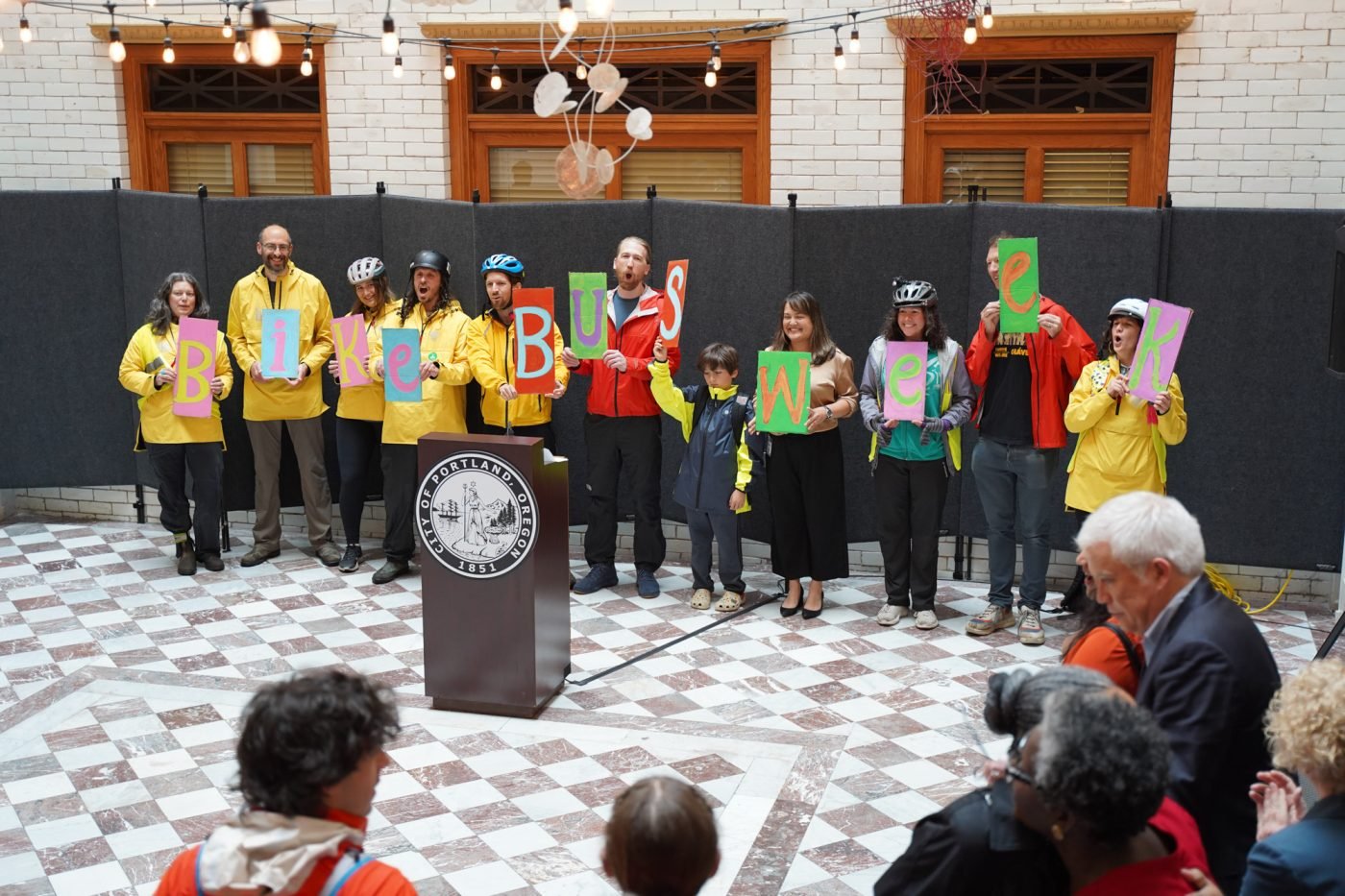
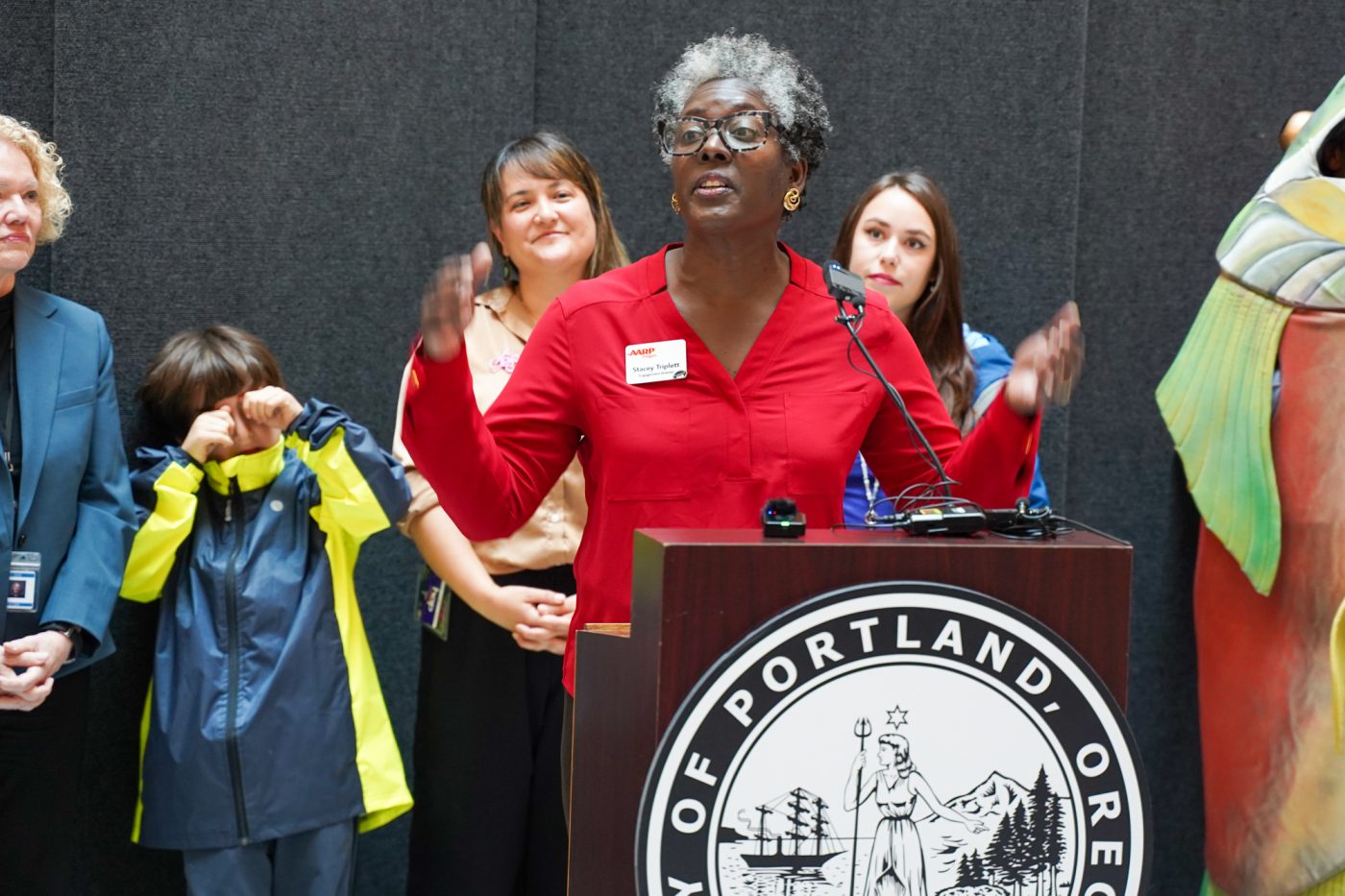
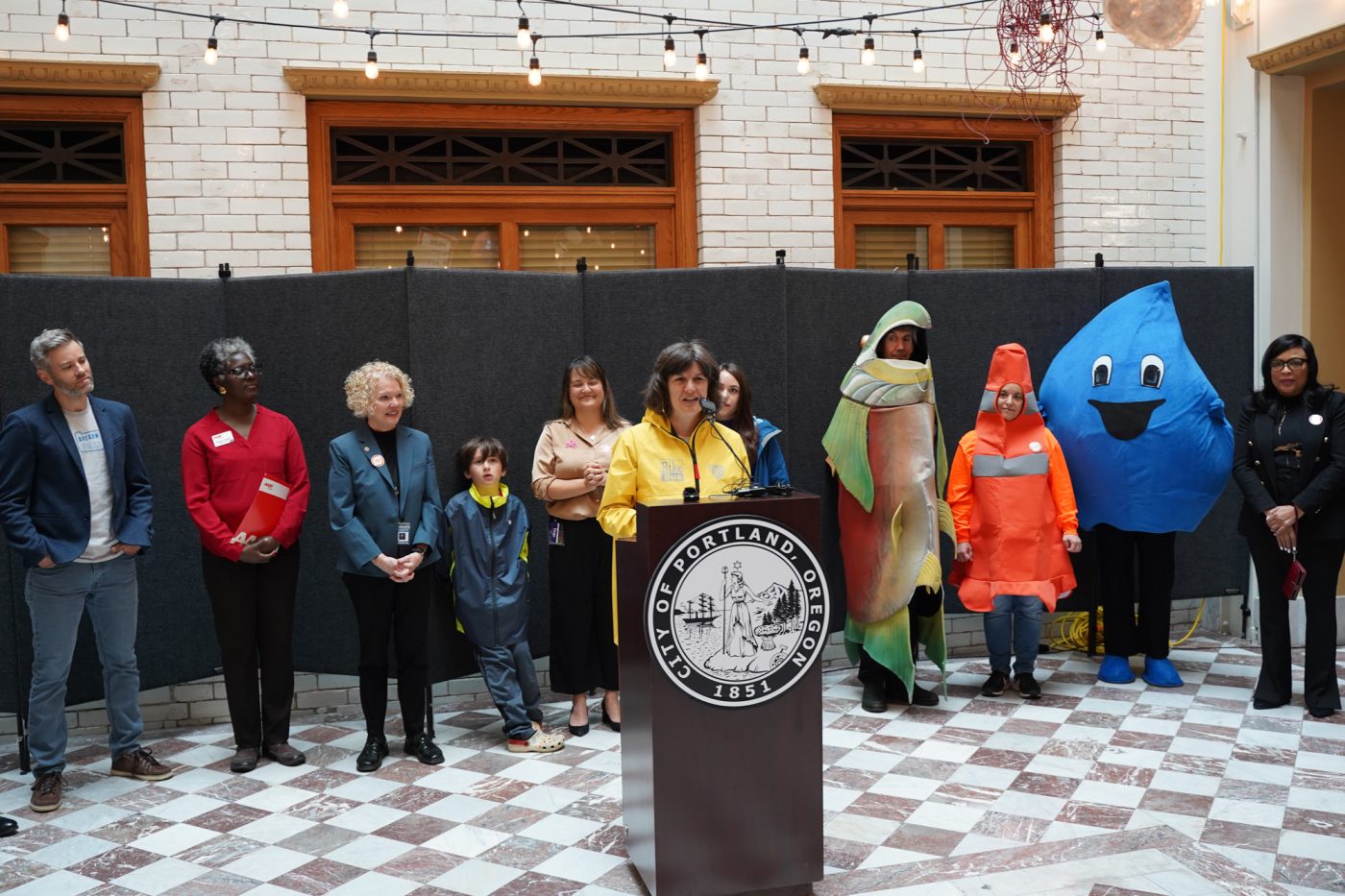
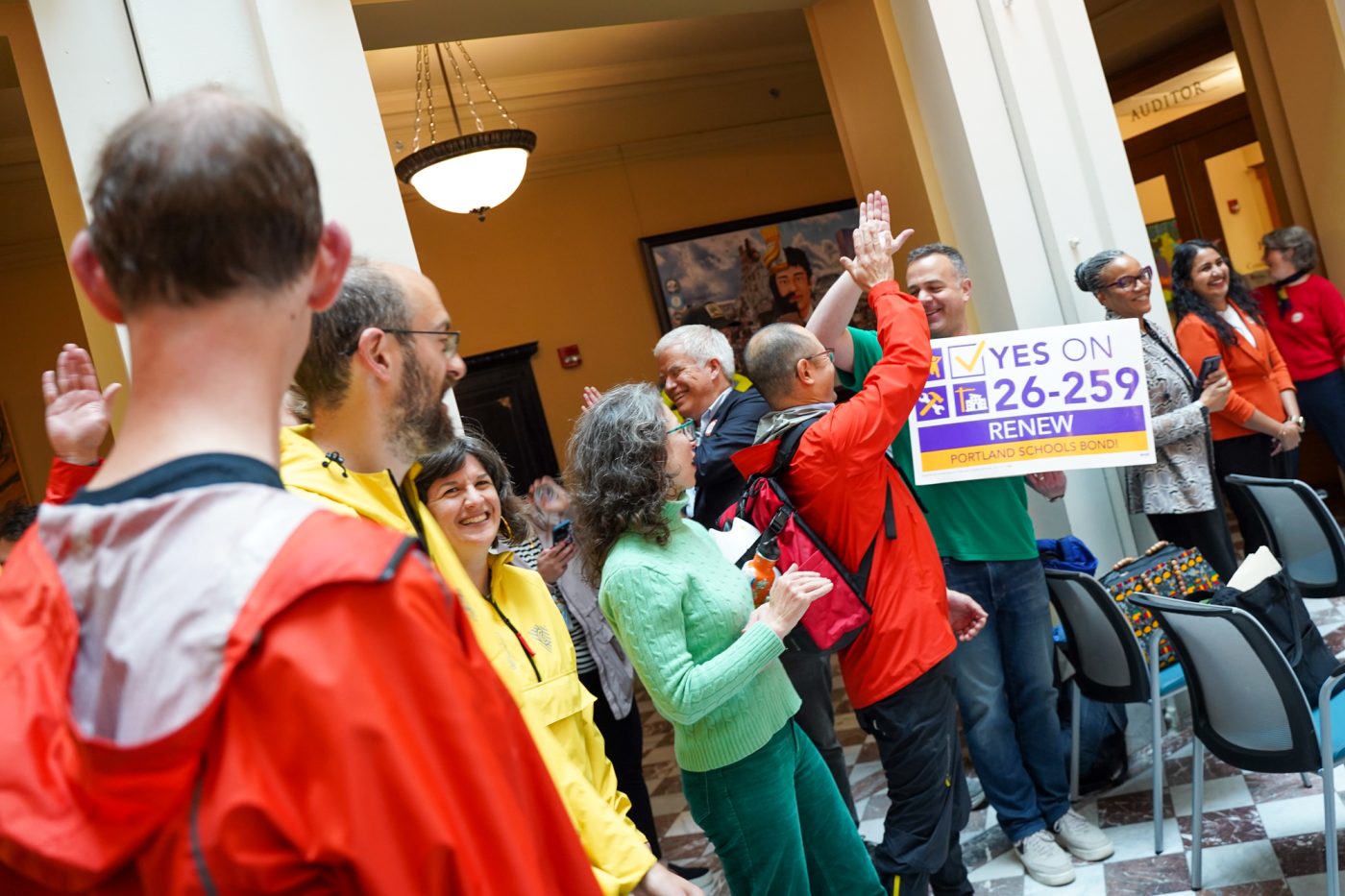
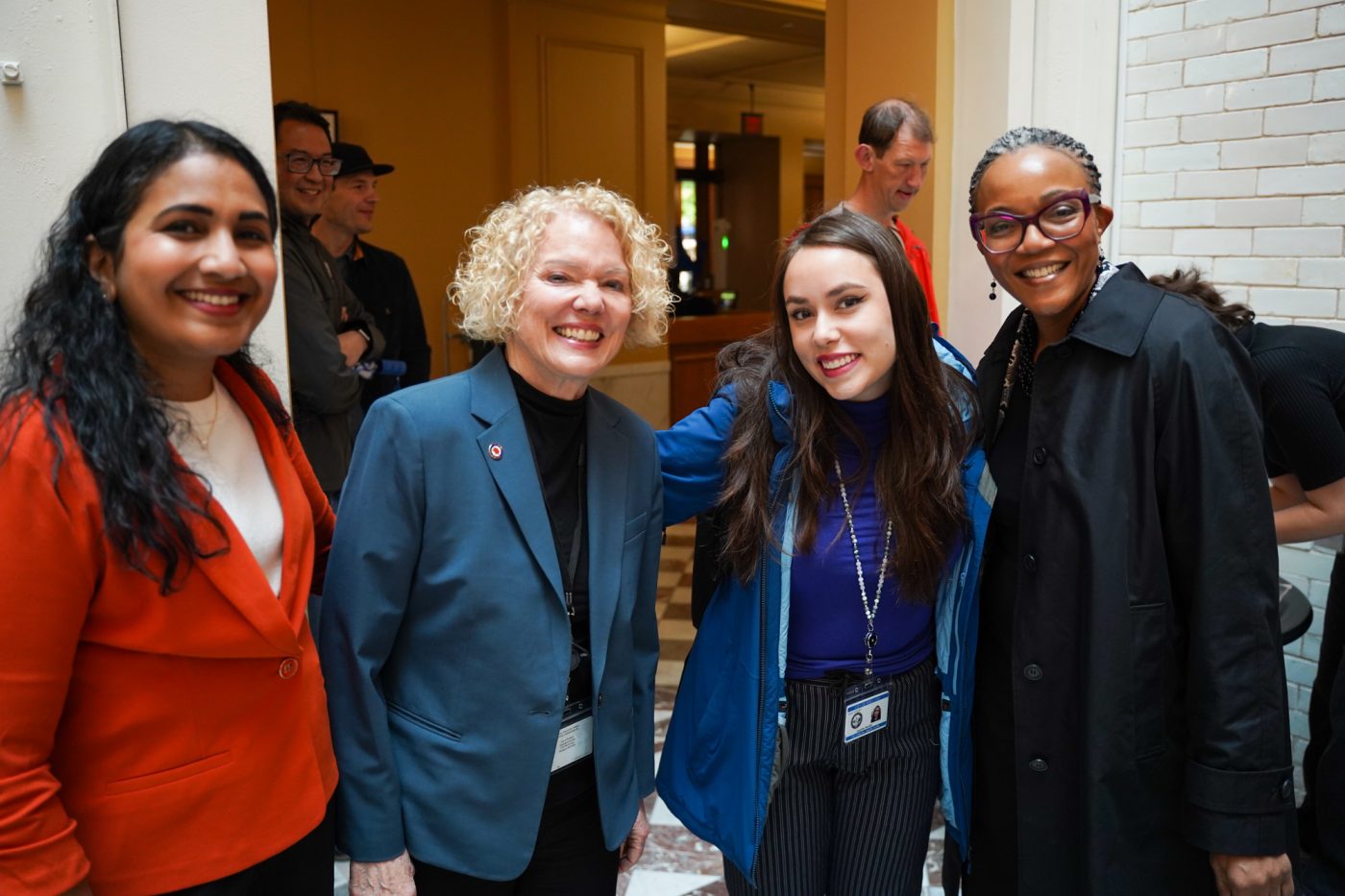
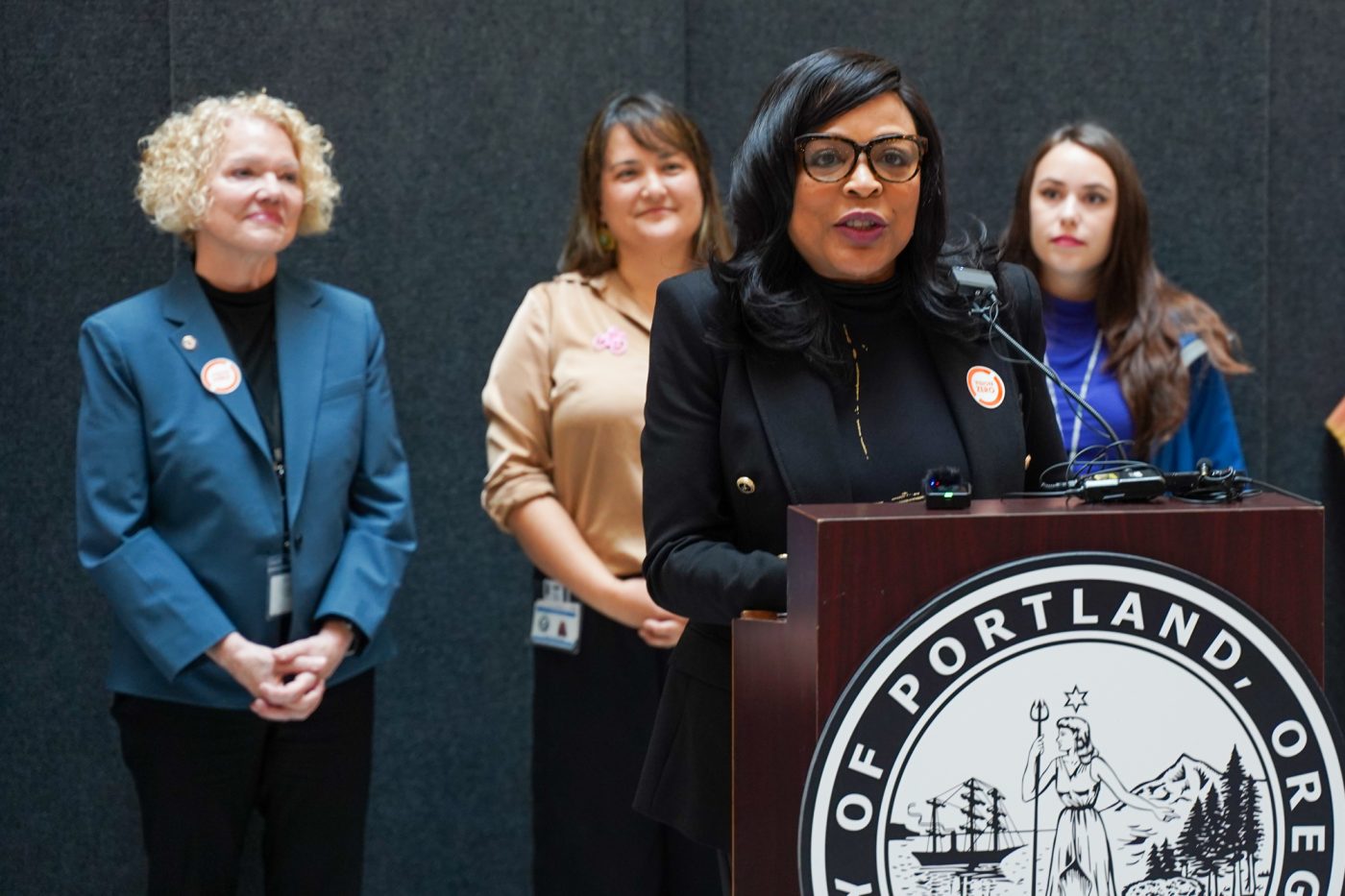

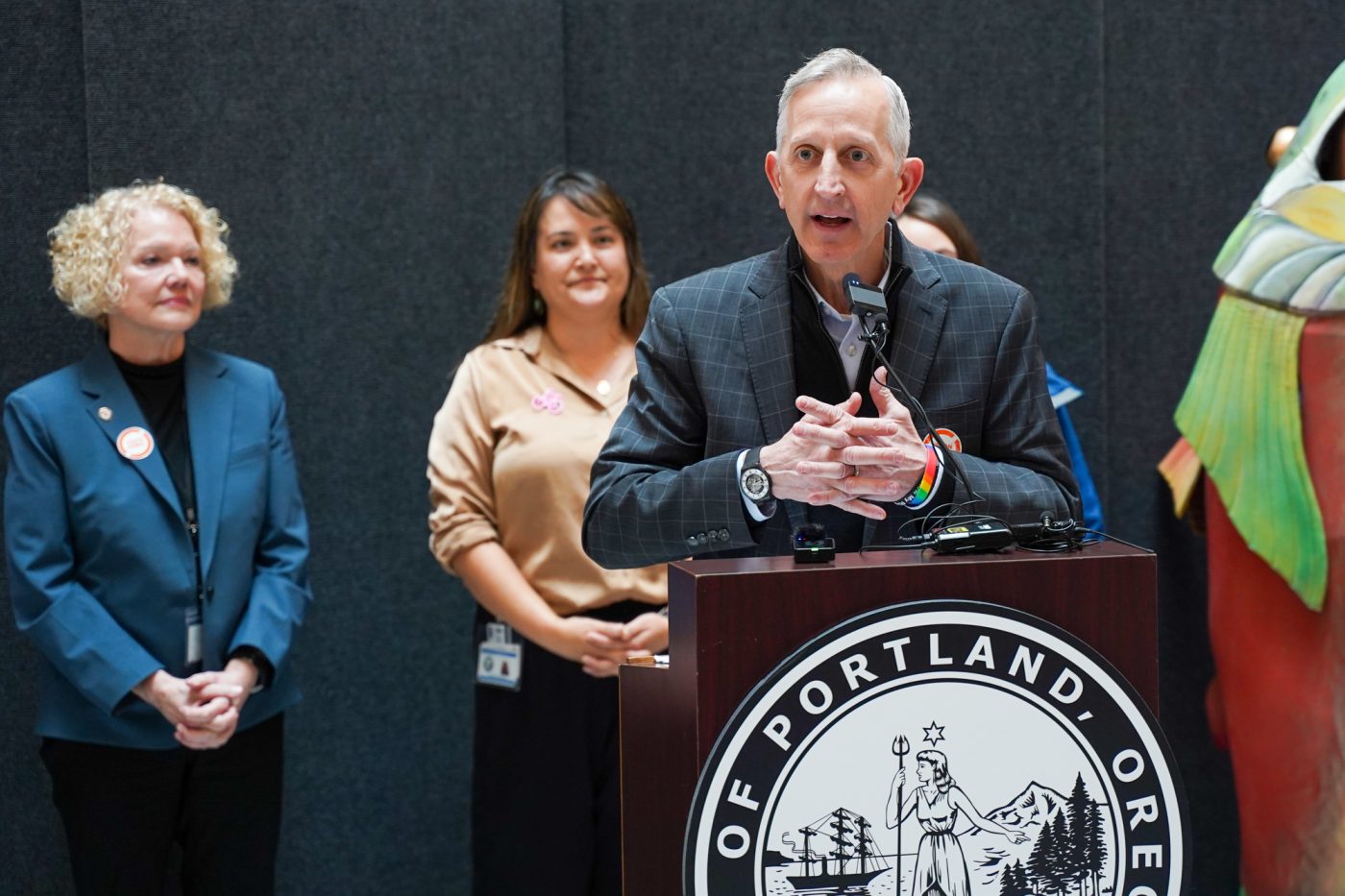
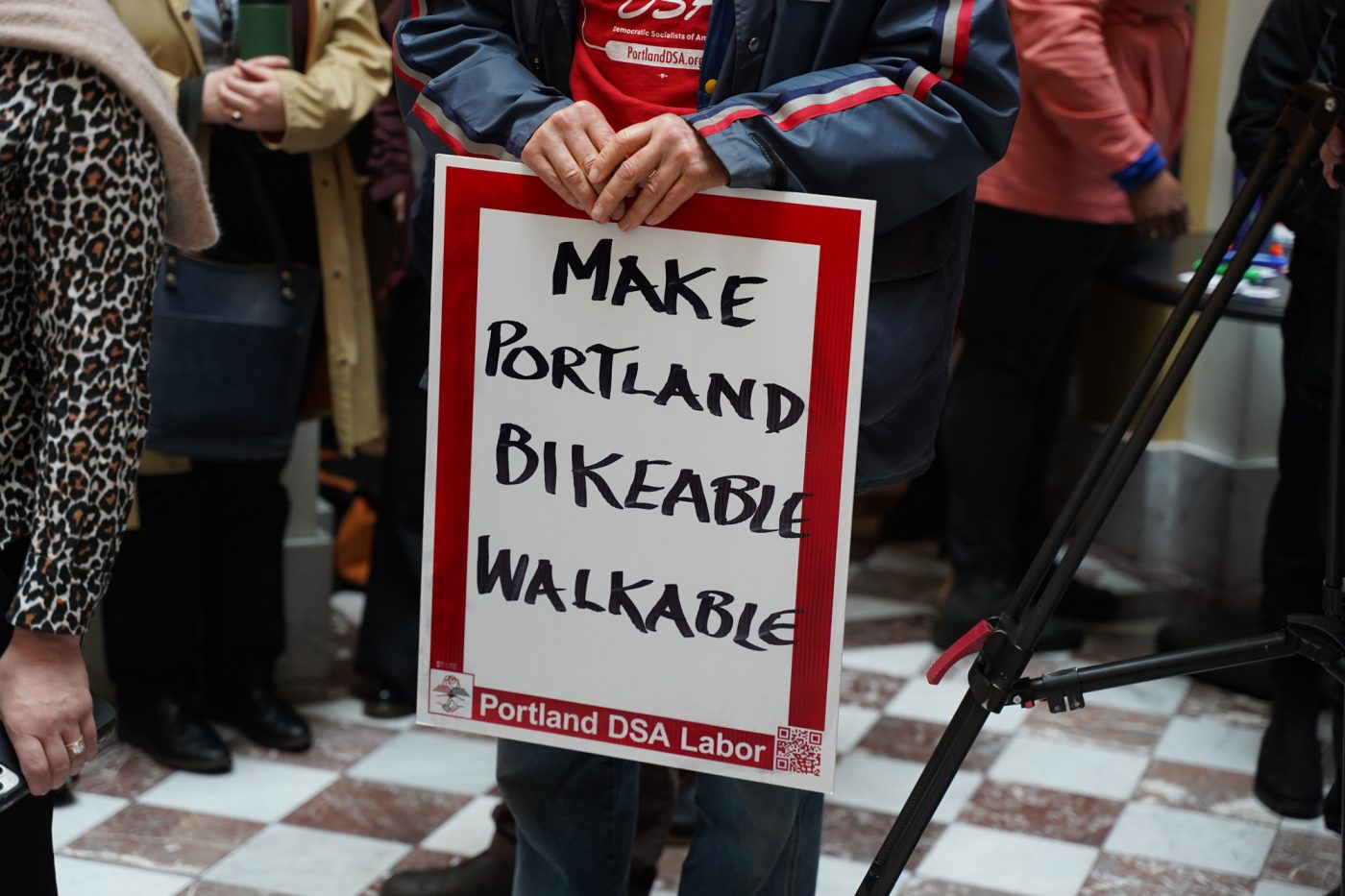



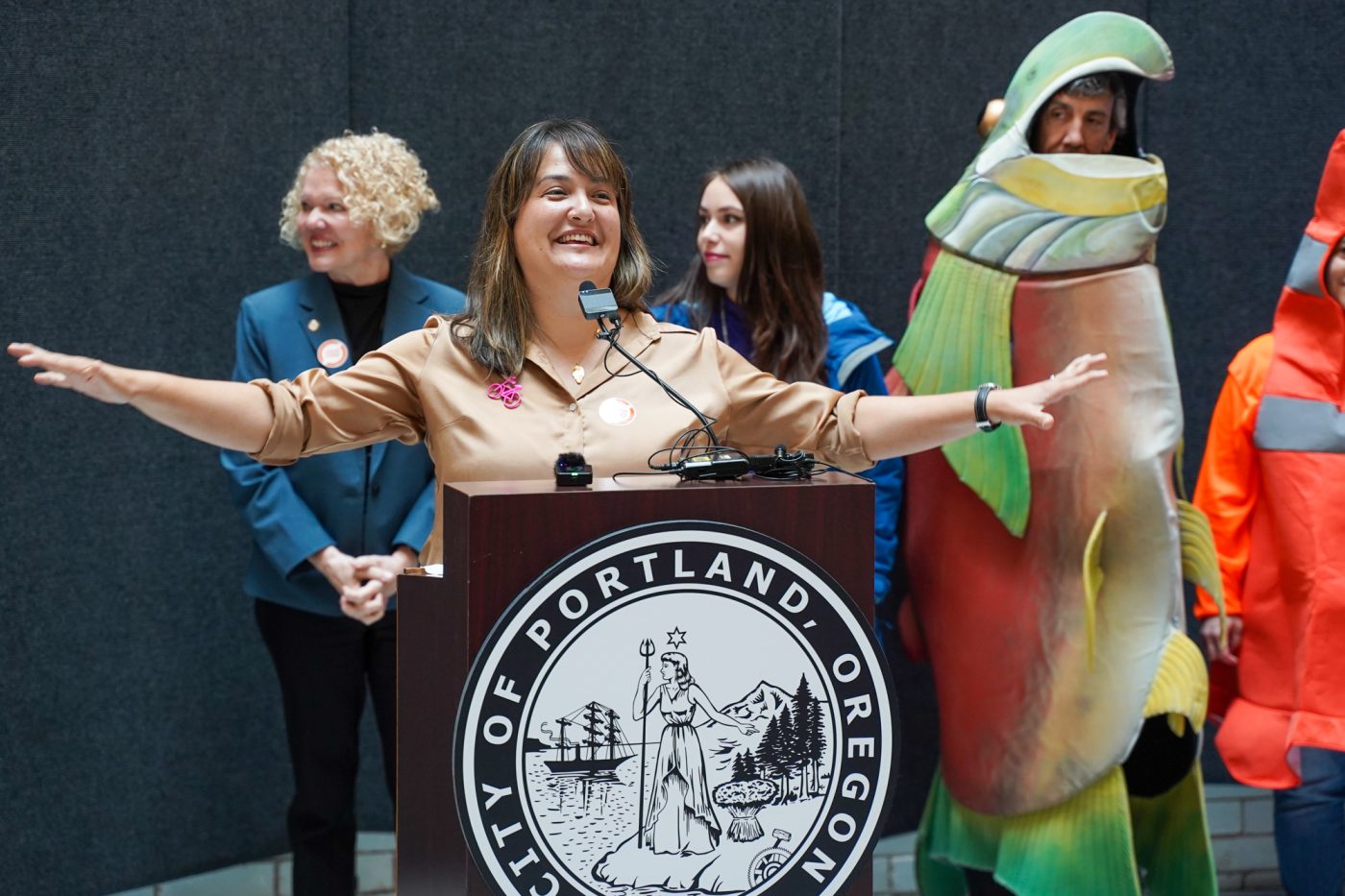

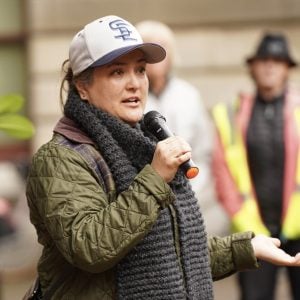
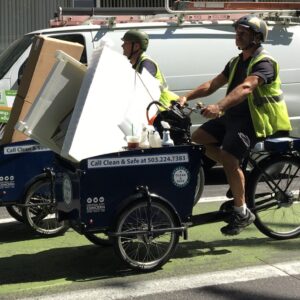
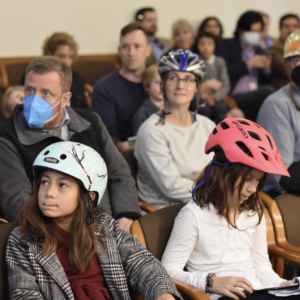

Thanks for reading.
BikePortland has served this community with independent community journalism since 2005. We rely on subscriptions from readers like you to survive. Your financial support is vital in keeping this valuable resource alive and well.
Please subscribe today to strengthen and expand our work.
Aside from the hype, did they actually implement any changes on the street?
During the Transportation and Infrastructure Committee meeting that followed the rally, there was a great deal of testimony, and then Councilors on the Committee spoke about some of the specific amendments and changes they will be advancing to make real change. So did they implement anything at the rally? No — because that’s now how government works. But this is a potential point of inflection now that we have a more responsive and less competitive City Council structure, and it matters that bicycle/pedestrian advocates turned out both to celebrate and to indicate we will hold the electeds accountable. The leadership on the the Committee can shape what the City overall will do. Let’s keep on them to do that.
They used to do these types of (mostly empty gesture overly-hyped) events just after completing some minor project on a high-crash corridor street like 122nd or Barbur, invite the press, several city councilors, the PBOT director and several senior staff, local legislators and NA leadership, etc. – it’s nothing new, they do them in every city, both out in the field and at city hall, I’ve even attended a few – but usually they actually have something to celebrate other than record or near-record numbers of traffic deaths and fatalities.
Portlander’s and ‘murricans, in general, have the unique ability to refashion grim reality into a hopelessly positive and optimistic narrative.
“Murrica 1776-2025 — poverty is a personal “choice”!
Climate crisis 1982-2025 — we are making “progress”!
COVID pandemic 2021-2025 — it’s so “over” and “herd immunity”!
Driver-caused carnage 2014-2025 — we have a new “task force”!
*Portlanders (sigh)
“and it matters that bicycle/pedestrian advocates turned out both to celebrate and to indicate we will hold the electeds accountable.“
If nothing comes of this and folks keep getting killed at a stunning rate will you encourage others to vote the elected out?
What exactly do you mean by hold them to account?
Yes, absolutely, we will not just try to vote them out, but run against them.
“hold electedes accountable”.
Yeah, we’re known for that in Oregon
I’m interested in learning more about why Councilor Morillo is specifically targeting Cesar E Chavez and not a more (and more consistently) deadly high crash corridor. I want Cesar Chavez to be 100% safe too, but it isn’t Portland’s most lethal street. Listening….
Every budget season each agency tries to paint a picture that they are the most hard-up for money, that they need more cash:
Police: property crime has gone through the roof, murders are up, pay officers more…
Fire Dept: Our city’s credit rating is based on call times, build new stations at…
Housing: We have an affordability crises and a severe housing crises, build more…
Parks: Homeless camps, garbage, drug crime, etc…
Transportation: Congestion, traffic crashes up, fatalities, etc…
…And so they have these crass rallies that in normal times might be considered in really bad taste, but the press absolutely loves.
Most of high-crash corridors in Portland are in District 1, we all know that, but 39th (what most people still call the street now officially called Chavez) is a lot easier to identify with, and yeah, it’s not actually all that bad compared to say 122nd, but most folks who drive don’t like any congestion at all and so the Councilors probably get more complaints about Chavez or 39th than they do about 122nd or any other really dangerous stroad, because historically, people who complain to councilors the most (the proverbial squeaky wheels we all hear about) tend to live in the richer parts of town, not in some bucolic edge of the city beyond 82nd.
Who is up for election in 2026? Are they campaigning yet? You bet they are!
Maybe most people who live in the Carolinas but hang out at BikePortland call it 39th. But most people in Portland that I encounter in my life call it Chavez these days.
I used to live just off of 39th, and now I live a few blocks off Portland Boulevard.
I still call it 39th.
I live a block away and call it 39th. No one has ever questioned it when I say 39th.
Piker, I still use Union and Front ………
Geez, y’all are messed up! I would never use the old names. I feel like if people stood up and went through the process to have name changed, it’s our duty to respect that and use the new name… especially if it was done in the name of bringing some type of respect/awareness/justice to a particular group of folks.
Most named Portland streets are named for slimy developers in the 1800s and early 1900s, except for the numbers of course, plus generic names like Marine, Airport, and so on. MLK and Chavez are probably the only truly honorable people in the whole bunch.
Of course it could be worse, they could be named after slave owners like Jefferson, Washington, and others, or slave-trade investors and shippers like Hancock, Adams, Franklin, etc.
Out here in the Deep South we not only have streets named after local slave owners from before 1865 and civil rights leaders from after 1955, but also various long-forgotten British aristocrats and government officials from before 1783.
Often times language is overlooked as innocuous (often by the people who have an interest in not examining it). And maybe sometimes it is. Are any meaningful fraction of people aware of a lot of the origins of street names or public places? And typically the debate stops there. As david pointed out below, a lot of our past historical figures are problematic at best. The balance between “presentism” or “whiggery”, on the one hand, and gross acceptance/celebration of terrible people (regardless of the year) is a good debate to have. It’s also a very rare debate.
I remember going to “squaw lake” which was (maybe still is) a ubiquitous name in Oregon. Those names got a change a while ago and a new bill proposes to speed up that progress. That’s really good, but I’m much more inclined to think that the examination of the past (the reasons for a name change), not the erasure of a name/word, is where people figure their shit out.
I live a few blocks from the intersection of Belmont and 39th. Then again, I still think of MLK as Union Ave. I’m not bothered by renamed streets though. In the early 30s the “Great Renumbering” had to change a bunch of the confusing and redundant street names around town.
Because it’s in their district. Isn’t that what regional representation is for? The other dangerous roads in District 3 are 82nd which is already getting a re-design and Powell which is hamstrung by ODOT. Chavez is the next and it has a lot of potential for walkability especially compared to high crash corridors like 122nd that need significant re-designs and development to make them walkable. Plus $800k is nothing for the kind of work that would need to be done on high crash corridors.
Inner Powell is hamstrung by ODOT, but Outer Powell is getting a very nice redesign on ODOT’s dime. I’ve taken the #9 to the 160s and Powell and gotten off on a dirt patch before – the new project may not be perfect but it’s one of the only ODOT projects I can support without much reservation.
And 122nd sucks to walk, but the bus stops on 122nd get more ridership than those on Cesar. At major transfer stops (Division, Powell, etc.) the 73 gets double the ridership of the 75 (source). The people who ride those buses are pedestrians, and I think defining walkability narrowly as a place that you would want to walk is a bit fraught. Is it fun to walk down 122nd? No. But if you do, you won’t find a whole lot less pedestrian activity than you would walking down Cesar (which is to say – not much away from a bus stop).
Having grown up just off 122nd I’m all for improving it for both walkability and Tri-met ridership but the question was about a District 3 councilor advocating for a road in their district. The same goes for outer Powell that’s well outside district 3 but inner Powell isn’t. It makes sense why they would seek a relatively small amount of transportation funds to improve something in their district as opposed to a huge amount to address a high crash corridor outside of it.
It’s a tough call. I also have a little bias toward 122nd, but it feels like apples and oranges.
Cesar Chavez:
I’m guessing there’s a lot of support for a redesign of 39th from most if not all District 3 Councilors. They seem very open to street safety and transportation reform. 39th has had recent repaving on the outside lanes north of Powell, which I presume didn’t kick in the bike bill. It can/will get a 4-to-3 conversion south of Powell, and while the sidewalks are pretty narrow north of Powell, a 4-to-3 plus bus stops might be doable-ish with just paint as an interim.
122nd:
A redesign (e.g., medians, separated bike lanes) of 122nd has little/no support from 2/3 of Dist 1 councilors other than Avalos (I’ve tried the other two). You’ve likely read Smith’s take on the IRQ, which reflects her views on street safety. Dumphy appears to be open to dialogue, but has little/no interest in cycling/ped safety. 7 people were killed on 122nd in 2023.
Depending on where you put the borders of any project, 122nd is 2-3x the distance of Chavez. If we want E. Portland to have any increase in cycling/walking, 122nd is likely the best choice for doing that. Also, the traffic counts in the southern part are much lower, making a phased approach (south to north) feasible. There is technically a plan for 122nd, but admittedly, it would take more than paint, and a lot of money.
Welcome to our new form of city government. Councilors will represent their district first, and everyone else second. Did you vote for this new form of government?
Which of course is inherently worse than councilors advocating for their fiefdom …. sorry, department …. first and all else 2nd?
I remember a drive with my dad downtown in 1985 (Portlandia was brand new and we actually went downtown to check it out) – the discussion revolved around why the form of city government in Portland didn’t serve a city our size at all well.
Whether the new form has issues or not doesn’t alter the fact that the old one was crap.
I think hand-wringing over what street is most deadly is a losing battle. In my experience, Cesar Chavez feels very dangerous, and people die on it. It’s also a relatively short stretch of road at 3.75 miles (the dangerous parts of Chavez are just from Hollywood to Woodstock) compared to other high crash roads (Sandy is like 10 miles long). There are urgent needs for pedestrian safety in so many places, so it feels natural to rank the needs, but deaths are an imperfect metric in a lot of ways.
Without drastic changes to all of the roads that have inherent safety issues – all of which seem to be places where extreme steps were taken to allow for more traffic to flow at the cost of everything else – people will keep dying on the streets. I think we need far, far more funding to fix this issue and often times funding to fix specific issues is related too narrowly to only one road (which is why all the major safety improvements are done in conjunction with a jurisdictional transfer or a semi-BRT project).
For my money, 122nd should probably the top city priority, but I imagine Councilor Morillo has more personal experience with Chavez as a D3 resident, and I welcome having any city councilor who actually cares about traffic deaths in a personal way even if it means taking a slightly pork barrelled approach to issues.
Some low-/no-cost Vision Zero ideas:
• Place the VZ team at the top of the organizational chart at PBOT. They must be able to veto any project which doesn’t meet safety policies.
• Grant the VZ team the ability to close a street after a crash to investigate the cause. They should be able to keep the street closed until PBOT can remediate the determined cause. This can be done cheaply with wands, barrels, and paint as a first pass.
“They should be able to keep the street closed until PBOT can remediate the determined cause. ”
If it’s a drunk driving far to fast and killing themselves or others will you instigate to turn Portland dry before opening the street again?
Prohibition has never worked, so no.
Checkpoints with armed guards, mandatory blood tests and harsh prison sentences for driving drunk though …….
(Of course I’m not serious – but every once in a while I wish people with so little disregard for other people’s lives would get their heads handed to them).
Hi City Slicker – I agree with you on the first point. Vision Zero will only be effective when staff is empowered. They are not empowered at this time within PBOT. I agree to you to a point on your second point. I doubt there will be any new revelations in terms of a cause of crash. It would be better to implement systemic changes throughout the city or county, not on a street by street basis. More effective to be forward looking instead of addressing issues after a life has been lost.
It is hard to believe that amendments to reallocate police budgets to PBOT will make Portland safer. Traffic is not the only issue of concern in Portland. But the police, IF ALLOWED, are a deterrent to traffic violence, property crime and person on person crime all of which are too prevalent in Portland.
The city council is all self congratulatory with vacuous feel-good proclamations “People are awesome “, but fluffy good intentions with no authority or backbone is just the same ineffective governance as the previous system.
I think our city needs a discussion about the right size of the police force. A discussion that cannot happen productively in the backdrop of nightly protests. And that’s exactly what is happening now! It’s healthy to debate how much money we want to spend on police versus other things. Many folks see that there are other ways to reduce the amount of people needing to be policed by building up community and focusing on creating a healthy place where people can thrive. Police are like hammers that will always find a nail, so I believe we need to be careful with how much we spend on them. Sometimes you need a hammer! But there are other tools that work better in some situations. And of course the idea with folks considering police funding cutbacks is that we should create a city where police simply aren’t needed as much.
Jonathan
In general I don’t disagree. Inspiring or compelling citizens to comply with the tenets of a civilized society can take many forms. Red light and speed cameras are law enforcement. Parking patrols that cite illegal vehicles are police. What is irrefutable is that without the presence of deterrence, be it traffic patrols or drug crime arrests, criminal behavior will flourish. Not every hammer is a sledge, but the tinker’s hammer of trusting the inherent good nature of people is woefully inadequate in countering criminal behavior
Thanks Granpa. But I think you’re doing the strawman thing a bit, which I find very common in this debate. NO ONE is simply hoping to rely on inherent good nature of people. Just because an activist says, “people are awesome” that does not equate to their entire belief system! Again, no is saying zero police or zero deterrence. At least no one that is being taken seriously in this specific debate.
” And of course the idea with folks considering police funding cutbacks is that we should create a city where police simply aren’t needed as much.”
We can only hope that those folks build the city where police aren’t needed before they start cutting the police and other safety features even further.
Even up here at JBLM with roughly 110,000 people where it’s incredibly regimented and much safer and cleaner than nearby Tacoma there is still a need for police. We have roughly 1-2 traffic fatalities a year and several speeders, but it’s good to know that there is a police presence just in case.
Hi Jonathan,
Do you have a particular metric in mind? Officers per resident, or officers per service call?
Or do you think we should just pick a dollar amount and let the chips land where they may?
Nope. This isn’t an area I am an expert in, so I don’t really have specifics.
Is police spending something you’ll leave to the experts? Or do you have an answer in mind that you’re working backwards from?
I rarely have answers to things Watts. I’m very open minded and I like to learn as much as I can — and even then, I am skeptical of my own beliefs sometimes.
So would it be fair to say that in your view, it is reasonably possible we are not yet spending enough on police just as it may be reasonable to say we may be spending too much? It seems like assessing the value and size of our police bureau in comparison to similar cities is as reasonable place to start.
According to the “Police Department Size Calculator” at defundpolice.org (probably not a pro-Police org), the Portland Police Bureau is much smaller per capita compared to the averages for the state, the nation and similar cities. Make of that what you will.
https://defundpolice.org/budgeting-tools/police-department-size-calculator/#state=OR&police-dept=C84&population-width=5&officer-width=5&chart-limit=20
I tend to believe Portland can and should be different, but I can appreciate the department size comparisons.
In general I’m a low-cop type of person. I want a healthy community w strong social spending where the goal is to have so little crime and criminals that we can get by w a lot fewer police!
If we were low crime, we could be low cop.
Fixed that for you.